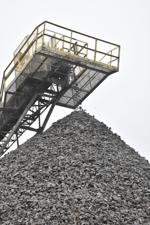
Vulcan Materials Company’s Morganton quarry is playing a pivotal role in North Carolina’s recovery efforts following Hurricane Helene, ramping up production and dispatching up to 600 truckloads of crushed stone daily to support the rebuilding of roads, bridges, and homes across the state.
Vulcan Materials Company is the nation’s largest producer of crushed stone. The company is in 23 states and four countries, employing 11,000 employees at these locations, with 22 at the Morganton location.

According to Community and Government Relations Manager, Denise Hallett, the Morganton location had 20 employees prior to Hurricane Helene, but hired two additional employees to meet the demanding increase in production.
The Morganton location, on Causby Quarry Road, dates back to 1986. It sits on 300 acres under a state mining permit, using only 150 acres, while the rest lies dormant. The managers here run the company’s Lenoir operation also. The production team shares its time between the two operations – one crew, two sites. The customer loadout and scales team are not shared, so both locations are able to be open for sales.
The quarry supplies a variety of crushed stone for use in making concrete and asphalt for bridges, roads, public infrastructure projects, and commercial/residential construction.
“You can’t build anything without a rock … and that includes roads, bridges, homes, churches, grocery stores, everything. The foundation is the rock you need to build off of,” Hallett said.

Inside, the quarry contains a large pit that goes down 250 feet that the Vulcan team digs for large rock. The team down rocks through a process called blasting, which produces crushed stone, or shot rock.
“We exist because you guys are here. … If there was nobody living here there would be very little demand for what we do. But because North Carolina is a growing state and it’s very popular, people continue to move here and communities get built,” Hallett said. “That creates the demand for our product.”
Most quarry locations are in central and western North Carolina because that’s where the ‘good hard rock’ is,” according to Hallett.
“Nature didn’t put the good hard rock everywhere, but mostly here and west,” Hallett said.
Inside the quarry, gravel lots are separated into categories by numbers that grade rock according to standards: 57s for instance are used for gravel driveways; 78s, or pea gravel, that goes into the surface of asphalt.
“94 to 95% of all the asphalt is crushed rock. Concrete, at least 80% of already mixed concrete is crushed. So in those two things alone, it creates a demand. You have to have a lot of rock in order to build out an infrastructure. It uses just everything we have here is used out in our local community to build with,” Hallett said.
The company services nearly 500 customers, which range from having one single-axle truck to fleets of about 60 trucks. According to Glenn Morris, sales operation manager, grading contractors work for NCDOT to rebuild roads and bridges that were damaged or destroyed by Hurricane Helene, while others are repairing commercial properties and homes.
Hurricane Helene Increased Demand
Kendall Jones, plant manager at Vulcan Material’s Morganton location, said the site normally averages about 120 truckloads of material to go out per day, but since the storm, that number has increased to 400 to 600 truckloads daily. Jones is the only female plant manager in the company.
“The company received countless phone calls for material that needed to go out due to the severity of the storm,” Jones said.

Although the Morganton location suffered damaged power lines and power outages, with the help of generators and a promise fulfilled by the City of Morganton, the location was able to begin shipping the following week after the storm.
Employees at Vulcan usually work 40 hours a week; now they are getting 60 to 80 hours per week. The typical nine-hour day for employees has shifted to 12 hours or more.
“We’re asking them to do a lot but it’s something that they’re willing to do because they know it’s important to get these areas back open again and getting lives restored,” Jones said.
“The quarry increased trucks coming in by 350%, which equates to about 10,000 trucks in three months. The Enca, Andersonville, and Spruce Pine locations also saw significant increases,” Hallet said.
During the aftermath of the hurricane, Jones said the top concern for the facility was safety. One of the concerns was how they would fit the need for extra trucks at the Morganton location in a safe, organized, efficient way.
“The goal is to get the rock out of the gate. Kendall fortunately has enough property she can maneuver,” Hallett said, referring to Jones. The team at Vulcan was able to do it safely and never ran out of inventory.
In addition to meeting the need for product, the local Vulcan team came together to bring supplies to other quarries and distributed 55-gallon burn barrels to local churches for residents to create fires for those who suffered power outages.
“We’ve got a good resource here that supports the community, and we keep that resource where it needs to be until we’re ready to use it. So essentially, what we do is just make little rocks out of a big rock here… And those little rocks are everywhere in Burke County and beyond,” Hallett said.
Charda Pearson may be reached at 828-445-8595, ext. 2012, or charda@thepaper.media.

